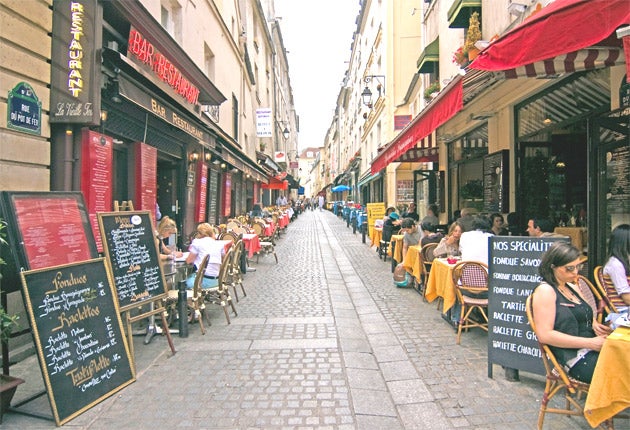French dinner table – now a UN heritage site

Your support helps us to tell the story
From reproductive rights to climate change to Big Tech, The Independent is on the ground when the story is developing. Whether it's investigating the financials of Elon Musk's pro-Trump PAC or producing our latest documentary, 'The A Word', which shines a light on the American women fighting for reproductive rights, we know how important it is to parse out the facts from the messaging.
At such a critical moment in US history, we need reporters on the ground. Your donation allows us to keep sending journalists to speak to both sides of the story.
The Independent is trusted by Americans across the entire political spectrum. And unlike many other quality news outlets, we choose not to lock Americans out of our reporting and analysis with paywalls. We believe quality journalism should be available to everyone, paid for by those who can afford it.
Your support makes all the difference.The ritual of the long and detailed French meal was yesterday declared part of the world's official, cultural heritage. A committee of the UN cultural organisation, Unesco, decided that the French mealtime tradition, and the place of food in French history and society, should be included in its list of the "intangible" jewels of mankind.
Confusion seems bound to arise, but the Unesco decision is not – in theory – a declaration that French cuisine is superior to other cuisines. Nor is it a declaration that coq au vin or bouillabaisse are endangered gems of world culture.
Nonetheless, France hopes that the decision will be seen as an endorsement of French culinary prowess at a time when other countries – including, horror of horrors, Britain – make claims for the superiority of their own celebrity chefs and top restaurants.
Paris suggested two years ago that the French mealtime tradition, with all its social rituals and associated skills and crafts, should be included in a new Unesco list of "abstract" achievements of the human race.
Unesco's Intergovernmental Committee for the Safeguarding of the Intangible Cultural Heritage, meeting in Nairobi, agreed yesterday to accept the bid. This was the first time that a gastronomic subject has been admitted to a list which already includes traditions and institutions as disparate as the Royal Ballet of Cambodia and the Mexican festival, the Day of the Dead.
The French success was quickly followed by the acceptance of a joint submission by several countries on the qualities of the "Mediterranean" diet. A Mexican submission on the importance of the centuries old maize-based culture of Central America has yet to be judged. Other traditions to join the Unesco pantheon yesterday were Spanish flamenco dancing and Chinese acupuncture.
The significance of being included on the Unesco's list of intangible jewels of the human spirit is not clear. In theory, the French government – which sponsored the bid in the first place – will now be obliged to take action to preserve the country's mealtime rituals.
The committee's decision yesterday spoke especially of the importance of food in a France as a "traditional social custom, for the celebration of moments in the life of individuals or groups". This could be equally true of almost any country or social group in the world.
More specifically, the French bid drew attention to the ritualised pattern and paraphernalia of the big family meal or dinner party in France, from the number of courses to the proper deployment of forks, glasses and napkins.
"A meal is an experimental laboratory for a food culture – it brings together all of its quirks and customs," said Annick Vin of the French heritage and gastronomy mission (MFPCA), which was placed in charge of the French bid. Ms Vin hopes that the Unesco success will encourage the French government – and French people generally – to stem a rising tide of snacks, fast-food and TV meals which threatens to transform the country's habits.
"We need to transmit (the love of food) and educate children if we don't want our food culture to be standardised," she said.
President Nicolas Sarkozy supported the French candidacy which – despite the small-print – has often been portrayed in France as a move to declare French cuisine per se part of world heritage. Many celebrity French chefs have supported the campaign. Others have been doubtful, arguing that it will give the impression that French cuisine is an "endangered species".
The Unesco list of intangible human heritage was created in 2003. There is also a list of sites and monuments of global importance – ranging from the Giza pyramids to the Loire valley.
The rival cuisines
Mediterranean
Fresh, simple and flavoursome, the Mediterranean diet is widely regarded as one of healthiest in the world. Linked with a range of health benefits including lower rates of heart disease and cancer, Mediterranean cuisine is characterised by its emphasis on fruits, vegetables, nuts, seeds, beans and olive oil. However, many swear it's the leisurely pace of meal times and the moderate consumption of red wine that are the real key to its benefits.
Mexican
Authentic Mexican cuisine is different to the Tex-Mex mix found in American-style chains. Varying by region, Mexican offerings include doughy tamales, slow-cooked meat barbacoa, or tortillas. But chocolate is Mexico's most historic culinary export. Chocolate was originally drunk not eaten, and the name is derived from the Aztec for "bitter water".
Join our commenting forum
Join thought-provoking conversations, follow other Independent readers and see their replies
Comments